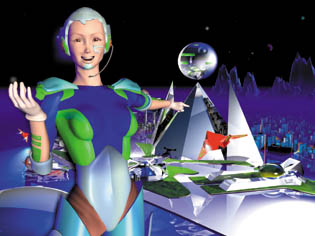

Rayken says he started searching the web for anyone who remembered Blaxxun or Cybertown, from small Facebook enclaves to random commenters on Twitter and Reddit.

“Coming back again many years later, I was surprised to find that no one had any concentrated efforts for reviving the website.” “Cybertown was a place for so many people to meet up in a virtual world really for the first time,” says Rayken. After being sold by Blaxxun and implementing a monthly fee in 2003, the platform declined slowly in the latter half of the 2000s, finally going dark in 2012.Ĭybertown’s death never sat right with some former citizens, though. But it never reached the prominence of later virtual worlds like Second Life. In the early 2000s, cyber-ethnographer Nadezhda Kaneva said Blaxxun touted over a million residents, although only 350 to 500 people were online at any given time.
#Blaxxun cybertown Pc#
Even people who were too young to remember Cybertown can find its influence in newer projects like the 2019 game Hypnospace Outlaw, which - according to designer Jay Tholen - was inspired partly by Blaxxun’s glossy promotional spreads in PC Gamer.Ĭybertown lasted well into the next decade.
#Blaxxun cybertown full#
The city is pure 1990s cyberspace, full of bright, sharp-angled rooms with minimal decoration and low-poly graphics. Cytonians could even run for elected office inside the city, although developer Blaxxun Interactive maintained the lion’s share of power through a semi-mythical figure dubbed the Founder.Īlong with platforms like Active Worlds and Onlive! Traveler, Cybertown helped bridge a generational gap between text-based worlds and 3D virtual ones. Signing up could feel like joining both a community and a real space in a digital world, years before that was an everyday occurrence. “You chose your avatar, you chose where you hung out, you chose your home, you chose what items decorated it, you chose what clubs you were part of,” Rayken recalls. (Participants of the project asked to be identified by their first names or pseudonyms.) Among other things, the platform supported importing custom avatars that looked like anything from ordinary humans to animated Christmas trees. “Cybertown was personal,” says CTR’s founder Lord Rayken. But for many others, it was an incredible discovery. One Orlando Sentinel writer, for instance, recounts getting banned after going on a frustrated robbery spree spurred by falling into Cybertown’s virtual pool.

#Blaxxun cybertown mods#
Higher-level mods were assigned duties like housing cleanup, deactivating the abandoned homes of former residents. They could then spend their time zipping around cafés, shops, a town plaza, and earning digital money called Cit圜ash by selling self-coded digital objects or holding jobs like a “Block Deputy” community moderator. Once they “immigrated” to the city, Cytonians could select the location of a virtual house that they could fill with virtual possessions. But the city echoed real life in a way many digital spaces of the time didn’t.Ĭybertown was a digital metropolis that players could experience through text-based descriptions but also by entering a 3D world inside their web browser. It followed a formula pioneered by multi-user dungeons, or MUDs: mostly text-based worlds composed of rooms, objects, and avatars, designed as much for social interaction as structured gameplay. The original Cybertown was launched during the early days of massively multiplayer online games, a few years before Ultima Online and EverQuest became second homes for millions of players. It’s the result of hundreds of former residents rallying to rebuild the digital city, drawing on everything from former users’ blog posts to the contents of their hard drives. Cybertown Revival, or CTR, successfully launched a pre-alpha version of a new Cybertown earlier this year. But since 2019, a group of former citizens has dedicated itself to resurrecting their old home. Coming back to your hometown can be an alienating experience, especially when all you find is a dead link to a long-deserted website.įor nearly a decade, that was the experience of Cytonians - members of an early virtual world called Cybertown, which operated between 19.


 0 kommentar(er)
0 kommentar(er)
